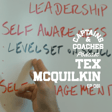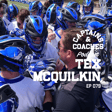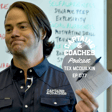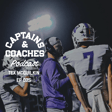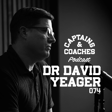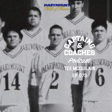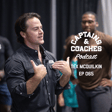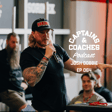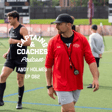Peak Performance: Mental and Emotional Preparation
00:00:00
Speaker
If you think of a swim, you know you've trained since from August all the way until March for, on average, one-minute performance. And if you're really good, you get to repeat that one-minute performance in finals. There are a million things that can go wrong with that particular performance.
00:00:21
Speaker
And there's also, there's a lot that goes on under the surface. I think what I realized is if you don't bring the right emotional and mental state to the the blocks, the the training hasn't mattered. And one of the best ways to create that right emotional and mental state is to feel like you're part of a group that inspires you to be your best.
00:00:47
Speaker
Welcome to the Captains and Coaches podcast. We explore the arts and science of leadership through the lens of athletics and beyond. I'm your host, Tex McQuilkin, and today we visit the Rocky Top University of Tennessee to explore the currents of excellence that shape extraordinary leaders.
00:01:01
Speaker
We're making waves with head coach, Matt Kredich, the swimming powerhouse behind the University of Tennessee's remarkable NCAA and Olympic legacy.
Meet Matt Kredich: A Collaborative Coaching Philosophy
00:01:10
Speaker
Matt's journey isn't just about championships and medals, though his teams have accumulated plenty.
00:01:15
Speaker
It's about creating a culture where athletes don't just swim in their own lanes, but ride the tide of collaborative purpose together. From his battle with cancer to his evolution as a coach, Matt has learned the most powerful strokes aren't always in the water, but in the human connections that propel us forward.
00:01:32
Speaker
With that, let's hand it off to Matt to help us raise the game. Ready, ready, and break. on location, Knoxville, Tennessee, Coach Matt Kredich. How are we doing, sir?
00:01:43
Speaker
Great. Thanks for having me on the podcast. I'm excited. the I mean, you've had great success this year. Fortunate that we were able to connect in January. Brett Bartholomew, Art of Coaching, you brought him in to assess the culture and provide tools for your team to finish strong throughout the season, and they were able to do just so.
00:02:03
Speaker
Yeah, we um just finished the NCAA championship. So our season begins in August and ends in end a March. So it's a long season.
00:02:15
Speaker
And we started working with Brett a few years ago and have learned that the best time to do the work that we do with him college.
00:02:28
Speaker
We usually do a call and and exercise midway through the season, but January is really critical because there's a lot of water under the bridge at that point.
00:02:39
Speaker
and um and And we have gotten to know each other really well. We've established some patterns and some of those patterns are good and some of them aren't.
00:02:50
Speaker
We're about to head into the most... pressure packed part of the season. So our SEC championships in February, national championships in March, And that's when communication, culture, and vision have to be, i think, the most clear.
00:03:11
Speaker
So it's also January is when the most, we're at our probably most fatigued, while the finish line is still kind of a ah ways away. So that's when you start to see the breaks and the and the the chinks in the armor.
Positive Team Culture as a Performance Driver
00:03:27
Speaker
And yeah, So the what we were able to do and kind of rounding each other up and thinking about culture and maybe acquiring some tools for um refining and elevating the culture and communication like that was really well timed and really helped us quite a bit.
00:03:47
Speaker
And how long you've been coaching swimming? I started in 1988. 1988. However long it is. ah I play defense lacrosse. I don't do math.
00:03:59
Speaker
So at at what phase and stage in your career did you start to see, okay, during the season, we need to either revisit, reinvest, or adjust the culture to maintain a strong finish?
00:04:11
Speaker
I think, i mean, every season is is one rep And there are so many inputs into that rep. So at the end of the season, I've always looked back and evaluated.
00:04:25
Speaker
and I'd say probably for the first 10 years, the main thing I evaluated was how do we train? Because I thought it was all about the training, you know the the stresses you put on, the the way we're trying to swim faster.
00:04:40
Speaker
I think for the next 10 years, I started training. paying a lot more started seeing examples in those previous 10 years of where the training I thought wasn't the issue there's something else and that's something else when things didn't go well or when they did was that we we either had a phenomenal culture that was able to maybe kind of smooth over some of the mistakes I had made or we had a corrosive culture or elements of a culture that was corrosive
00:05:11
Speaker
um and And that would almost negate any good decisions that I made in in training. and So the past 10 years have put a whole lot more emphasis on making sure the culture
Team Identity and Emotional Resilience
00:05:26
Speaker
Because if you think of a swim, you know you've trained since from August all the way until March for, on average, a one-minute performance.
00:05:39
Speaker
And if you're really good, you get to repeat that one minute performance in finals. There are a million things that can go wrong with that particular performance.
00:05:50
Speaker
And there's also there's and there's a lot that goes on under the surface as well. Do you want me to change that? That's OK. It's athletes being athletes out there.
00:06:03
Speaker
um so I think what I realized is if you don't bring the right emotional and mental state to the the blocks, the the training hasn't mattered. and And one of the best ways to create that right emotional and mental state is to feel like you're part of a group that inspires you to be your best.
00:06:24
Speaker
So instead of just focusing entirely on yourself and looking for threats, some of which might be in your own team, you take comfort in the fact that you are part of a really powerful organization with really high standards that has continually challenged you to be your best.
00:06:44
Speaker
So you're used to associating yourself with, for us, Tennessee Swimming. You know, the Tennessee swimming inspires me. Just the thought of it inspires me um because of the experiences I've had, because of who I know I am when I'm when I feel like I'm representing Tennessee swimming. So it's like this.
00:07:02
Speaker
It's a you know, it's a superhero's cape that you get to put on when you put on the Tennessee cap if we've done it right. And that has a way of helping, ah again, smooth over what might be, you know, a missed week of training in in January for sickness or um you know, some issues at with a boyfriend or girlfriend or at home that have bothered you. But now if you can bring yourself to the moment and you feel good about your team, it's those states, those emotional and mental states can emerge when when you want them. Yeah, and it's excellent that a coach is thinking about that to then build those walls and barriers.
00:07:44
Speaker
Sometimes they happen naturally with teams. I'm sure you had ah groups that just clicked. Yeah. And other times where you're doing your darndest and there's still some form of conflict within there, culture killers, envy, resentment, entitlement, something where it it was boiling underneath. It wasn't communicated up to you.
00:08:06
Speaker
And then you didn't catch it until that snake or dragon was too big. Yeah. And, and sometimes that snake or dragon is operating and I may not catch it until a couple months afterwards because it, it was below the surface.
00:08:20
Speaker
Problem with that. i think I've learned this over 30 plus years I've coached is it's, it's a mistake for me to think that,
00:08:32
Speaker
my mistake was missing what was going on. Like I'll never know everything that was going on. The, where wherere the, whatever that issue was, where it spread was within the culture of the team, which I'm certainly a part of, but not everybody knows about it.
00:08:55
Speaker
And so the team ethos let that, let that happen, let it fester, grow and so on. And so it's, even if I'm too far downstream to have done anything about it, ah and or even if I'm, if I can see it and maybe do something about it, that's not as powerful as the team being able to take care of it or team recognizing when that pattern emerges and having an answer for it.
Managing Conflicts and Cultural Norms
00:09:27
Speaker
And how are you, allowing that team to operate? you have team captains or do leaders step into a a a captain role or they assign that name, title, or they just take charge?
00:09:40
Speaker
We've tried it a number different ways. And I think where we're most comfortable now as a staff is um allowing delete the leadership to emerge organically. And that doesn't mean we just sit back and watch.
00:09:54
Speaker
It means that Number one, we we have um the the greatest team event in swimming is a relay.
00:10:04
Speaker
got four guys that are dependent on each other. And um and in swimming, it's not it's not necessarily the norm, but it's not unusual to have a freshman on one of those relays.
00:10:22
Speaker
So we encourage our freshmen from the very beginning to and to see themselves as leaders. And maybe all that is for them at their that point in their development is to have the understanding that their actions impact the team.
00:10:38
Speaker
That's it. Just have that awareness. For others who are used to leading, and many of them are, we ask them to look for opportunities to exert influence in a direction that they feel like the team needs to go.
00:10:53
Speaker
may just be, it may be just with the other freshmen. It may just be with one person, not as, they're maybe not as comfortable trying to lead a senior.
00:11:04
Speaker
um But we want to give them permission to be leaders because if you make them wait and then we need them on a relay, they have a a sense of, well, I'm not fully here yet. and And if they have a sense of ownership over the team and they have seen and understood that they have an impact, then it's that's an easier role for them to step into.
00:11:29
Speaker
and from that point on, you know we i think we talk to each class each year. We pull them aside and talk to the class. I do this with individuals as well. um I think there are sort of...
00:11:43
Speaker
growth stages that accompany the year you are in in college. So senior year, most people are really focused on okay, how how how can i have the biggest impact on this team possible?
00:12:02
Speaker
And so they're really all about the team. Junior year, they're starting to kind of look outward and they see, okay, i' after two years, I've been so impacted by the this the leaders on the team, usually the seniors,
00:12:14
Speaker
um that I want to, I'm going start watching those seniors cause because that's kind of going to be me in a year. and And so they started evaluating and they also think, okay, well, I...
00:12:27
Speaker
I have done this twice. I know the landscape. I want to lead. And so there's more of a hunger for it. The sophomore year is kind of year of, okay, you're you're you're done doing things for the first time.
00:12:41
Speaker
Now turn back, look back at the people who follow you and you're the closest to them, help them navigate the challenges of freshman year better.
Growth Mindset and Self-Awareness in Training
00:12:51
Speaker
So we try to send the message frequently that everyone has a leadership responsibility.
00:12:58
Speaker
um And then we call out the instances of great leadership. And this is all, you know, this is not necessarily in competition, although sometimes it is. um We call up those those instances and and celebrate them.
00:13:14
Speaker
Time out. Feeling the weight of the world on your shoulders? Actual training? Getting squeezed out by life's demands? The Old Bull program on Train Heroic was built for warriors like you. I create targeted six-week training cycles that systematically address knee, hip, back, and shoulder health. The foundations that keep you moving when others break. No wasted time, no unnecessary complexity, just intelligent programming that adapts to your schedule and your body's needs.
00:13:42
Speaker
Each cycle manipulates key lifts to maximize results even when time is scarce because old bulls don't stop training. We just train wiser. Whether you're managing old injuries or preventing new ones, this program keeps you powerful despite life's limitations.
00:13:59
Speaker
Start your seven-day free trial and train rolling by clicking the link in the show notes. Old Bull Program. Because the world needs your strength. And now, back to the show. Ready, ready, and brick.
00:14:10
Speaker
Yeah, that that reinforcing, that helps to bring it home. And the sometimes from a head coach or leadership position, you don't acknowledge some bad behavior behaviors because you're so focused on the the practice plan or the program we have to do today.
00:14:26
Speaker
So now how do you help action? seeing And I like how you went senior, junior, sophomore down to freshman. How do you start to action those team members to then take care of those little things so then you can focus on the team energy, the practice plan and accomplishing? Because you're you're thinking from August, you're already thinking ahead to March.
00:14:46
Speaker
Yeah. Well, that I think that's where, um I mean, certainly working with Brett has helped the most. And and we have...
00:14:58
Speaker
coaches on our staff who are really skillful at, um, at coaching the individuals through those situations individually. Um, to us, the practice environment is really,
00:15:15
Speaker
ah it it's, it's the, maybe the most intensive expression of the the culture of the team, uh, because that's where we apply the pressure and, um,
00:15:28
Speaker
when we see ah a conflict that's not either addressed in a productive way or what, or or isn't seen through to completion, we try to coach, maybe pull the biggest lever. So maybe it's one person who we can say, hey you know, when this happened, if you would respond a little bit differently, i think that the group would have been impacted differently.
00:15:56
Speaker
um Or if it's a couple of people that are, that are butting heads and call them both up and say, all right, let's, let's resolve this. But it's, and I think systemically, it's really good to, to role play, um to have some language around how, how to respond to somebody confronting you and how to confront also.
00:16:19
Speaker
um and to remind ourselves, the conflict is ah change creator and it's necessary. Like the sign of a healthy team is not, you never have conflict. A healthy team is a team that can have conflict and and work through it and be better at the end of And and Sometimes they just need vocabulary and other times they need permission.
00:16:48
Speaker
um And sometimes it's also ah can be more of a mandate. You guys got to solve this. This is corrosive. Yeah. And putting those barriers in place or putting them in a room, they wouldn't have that conversation otherwise. And it becomes really corrosive.
00:17:06
Speaker
Yeah, and that's that's kind of the locker room. Like the locker room is where it things can – um where conflicts can escalate unfettered by an adult in the room. And and again, that's ah where the culture is really important because the leaders, the best leaders will step forward. When they hear something, they'll turn around and say, that's not how we address things here.
00:17:33
Speaker
You guys need to work it out. And we, we've tried having captains before and I found that what that does, there there's and in soccer, the captain has a very specific role on the field, right?
00:17:51
Speaker
There's no agreed upon specific role for a captain in swimming. It's not necessary for the competition. It's not necessary, period. and And so what we found is that when you name a captain, you've also actively not named other captains.
00:18:06
Speaker
And that tends to make some really good leaders, situational leaders, move sort of back into the shadows. Mm-hmm. And so situations like the locker room, somebody may have an answer for, you know, a conflict that's happening, but they're thinking, I'm going to let the captain take care of it.
00:18:27
Speaker
There's less urgency to to let the culture take care of it. Mm-hmm. Yeah, I've even even seen that at the the team the team level, the team dynamic of I'm not a senior or I'm not the captain and allow that.
00:18:41
Speaker
And how I aim to get in front of that is leaders lead. That's right. See on the chest doesn't matter at this stage. If you know what's right, let's empower you to to say what's right. And like you said, the year they don't have the tools.
00:18:56
Speaker
Sometimes it's the confidence. yeah they They don't know how to. or they're worried about the the social backlash within school. And, and yeah, the, ultimately the, the, the culture can help build and elevate to understand what is right and wrong.
00:19:12
Speaker
And when, even if a captain starts acting wrong, do leaders like real leaders on the team, then start to stand up for the, the cause, the fight, the team and et cetera.
00:19:23
Speaker
Yeah. That takes a lot of strength to be able to do that. a lot of strength. And yeah, I ah i think that's why it should be a constant, if not conversation, at least a um ah frequently um and amplified theme that our greatest performances are going to come out of a culture that's, that's really healthy.
00:19:51
Speaker
And then define, we have to define that in a lot of different ways. Yeah. And often with with youth, younger athletes, college, high school, there's a negativity bias, just a a lack of confidence. yeah So how do you start to instill the idea of possibilities for your team and get them to start believing? Because that's that's a whole lot of beliefs and banners up on the wall in the the the pool here.
00:20:17
Speaker
Having a growth mindset is really important. And that that's one of the elements of our culture that that we feel like is essential. And we don't necessarily...
00:20:32
Speaker
um we don't use that term all the time. But what we do is, from the very beginning, we talk about the importance of self-talk and group talk.
00:20:46
Speaker
So... The, you know, it's, this is an old one, but it's really powerful. The statement, I can't, when you're faced with a challenge is, is really limiting. So we, people have heard that a lot, a lot of times, but acting on it is, is maybe less common.
00:21:10
Speaker
So when you hear it from a teammate, then that's one of the early and easy ah kind of role playing exercises we go through in the beginning of the season is ah define a complaint. What's, what's a complaint. It's, it's identifying a problem without a solution.
00:21:29
Speaker
um What does negative talks sound like in a lane? Cause they're down in the water and we can't always hear everything. So what does it sound like? And how, how are we going to address that?
00:21:40
Speaker
ah Because, we It's easy to agree in a non-emotional situation, we're not going to complain and we're not going to limit our possibilities.
00:21:54
Speaker
So we do talk early about how how um we address those things and what the alternative is. is really powerful instead of saying, i can't say, oh my gosh, I'm really struggling with this.
00:22:08
Speaker
Now you've opened yourself up to be encouraged. You've opened yourself up. You've created some vulnerability rather than an absolute limit. and And what's behind that statement is I'm really struggling is this possibility that I know I can do it,
00:22:28
Speaker
But I'm just really struggling to do it right now. And so that is a message that our staff tries to send, that there's there's always a way.
00:22:39
Speaker
and We just have to find it. Some days it's really hard to find it. And you may not. But if you leave the pool thinking, I just couldn't do it today, then you have you put a limit on yourself.
00:22:51
Speaker
If the next part of that sentence, I couldn't do it today, but I'm going to find a way. And if I were to go back again, maybe I would prepare differently. you know Maybe I would have eaten something different or eaten lunch.
00:23:02
Speaker
Maybe I would have slept differently. like you You can go back and say... But but it's really helpful, I think, to... to say, i just ran out of opportunities rather than I ah can't.
00:23:15
Speaker
And so that kind of mindset, that that is essentially what a growth mindset is. Or wasn't able to do it today, but I'm going freaking figure out how to do it the next time that comes up. Or I'm going to get better at it. i I did get better at it.
00:23:29
Speaker
That you're always growing, you're always moving towards something, and there's no limit how far you can go.
Building a Supportive and Inclusive Team Culture
00:23:36
Speaker
You're just going to be limited by time and opportunity. And so I think we send that message pretty effectively and pretty powerfully.
00:23:44
Speaker
And it's ah it's the truth. I mean, I don't know any other way to say it than that's just the way things work. Because when you do lift that governor off of, I can't, I'm too tired, like i'm I'm too sore, I'm too tired.
00:24:04
Speaker
When that's gone, then people do amazing things. And especially when when you have an environment of people who all believe the same thing and who want to do something for each other, the you know the amazing happens.
00:24:20
Speaker
Yeah. I joke with the the high schoolers I work with. We don't say the C word. Yes. and So, and then the, the providing an alternative, that's huge.
00:24:31
Speaker
So like you mentioned, self-awareness for, for the freshmen and the younger so self, like that self-leadership of you're just catching yourself, say it, and you're catching yourself, say it. Now you're catching yourself, think it, and you have an alternative.
00:24:46
Speaker
Now I enter into sophomore year or seasoned freshmen who's got ah some responsibility during meets, they hear somebody else say that whether they're a senior all the way down to his classmates, then now it's social awareness. I hear it.
00:25:01
Speaker
Yeah. I have the confidence, self-management to call them out for it in a encouraging way versus uh, a negative sense. Yeah. So the, and it encourages them to call out other behaviors and teaches them how to cut call out other behaviors in a, uh, uplifting sense versus ah just jump down their throat sense.
00:25:23
Speaker
Yeah, exactly. i think that's a great point that the this the ah little self-talk out loud that you can can playfully say, like, ah you know, this this, I can't do it.
00:25:39
Speaker
No, no, wait. We don't say can't. You haven't done it yet. Mm-hmm. That's it's playful. Right. But it's also, like you said, it's the act of correcting somebody. It's the act of kind of holding somebody accountable to an agreement that we have that we don't talk that way.
00:25:56
Speaker
It does make it easier to have to call out maybe more challenging behaviors in a, whether it's playful way or less threatening way than just, you know, stop doing that. Yeah.
00:26:09
Speaker
and Jumping at them. And then yeah with within, and it you got to help me how, I guess, swim works within team dynamics. We got a running clock and multiple people are on and off the field.
00:26:22
Speaker
So some guys are getting a lot of time because they're the right matchup for this team. Other guys, not so much. So there's a lot of shared time and some guys, they don't get a lot of playing time. Now, how do you manage leadership, the long season, and just give and take of of meet time? How do meet times work?
00:26:42
Speaker
where um So, yeah, walk us through that, and i have one follow-up. So in swimming, there's there's no regular season champion. So we have competitions through the year to to learn about competition. There's there's no real...
00:26:59
Speaker
real like We want to win dual meets, and you know coaches are proud of their dual meet records. But you can go 0-10 in a season and then go win a national championship. It doesn't keep you from going to the national championship.
00:27:12
Speaker
Having said that, um the it doesn't mean that meets aren't important. And we only have usually four opportunities to swim an event. So there are some people that don't get to swim.
00:27:26
Speaker
Where that has the biggest impact is on... the that feeling of the individual that they can impact the end of season goal.
00:27:38
Speaker
So because the dual meets don't matter that much, we set our are performance goals around end of the season, so conference championships and then national championships. and if And we talked from the very beginning about all the ways that you can impact our results.
00:27:54
Speaker
So Let's say we've got at a conference meet, we've got 22 men scoring. um ah use the example that a great teammate might help 22 men each score two more points than they would otherwise by being inspiring, um by being ah a great example, by helping, you know, lifting people out of a funk.
00:28:25
Speaker
That's 44 points that that one person has impacted for the team without swimming a stroke. And it's important for them to keep that in mind because everyone goes through times in the season when they don't feel like they're performing at a level that's really helping the team.
00:28:45
Speaker
mean, I think most most people feel that way. And the people who aren't fast enough to get one of those four lanes very often start to withdraw unless they feel like they're important, unless they feel like they have an impact.
00:29:01
Speaker
And as we get closer to the end of the season, we can send 22 guys to the conference meet, but we may have 30 on the team.
Integrating New Recruits and Maintaining Team Values
00:29:08
Speaker
Eight men or let's say 10 men who are insecure, that they they don't feel like they have a a sure spot on the team.
00:29:18
Speaker
As soon as one of them feels like I'm not going to make it, there's a real danger of them withdrawing. Mm-hmm. Giving up, losing motivation.
00:29:30
Speaker
and I don't mean giving up like stopping. I mean, just in their minds, starting to lose a sense of purpose. But if we've planted that seed early in the season, that everyone is responsible for the team's performance at the end of the season because they're Whoever the theoretical bottom guy on the roster is, if that guy is nipping at the heels of the you know the five guys in front of them and making couple of those guys nip it at the heels of the five guys in front of them and so on, then that churn makes the bottom part of the team a lot better, which then works its way to the theoretical top.
00:30:08
Speaker
And it can just be one person who's the straw that serves the drink. And if you if you have those people, then you're your team gets better and and time becomes your your ally because the more time that that person is is stirring the competitive juices, the the more time that has to act.
00:30:31
Speaker
Mm-hmm. Yeah. And then when that individual does get their moment, the whole team is also behind them let it shine. And it just keeps this, this culture building and growing and and strengthening it.
00:30:44
Speaker
Yeah. And Luckily in our sport, those people usually get their time to shine. So after our conference meet, we always come back home and have an invitational meet.
00:30:55
Speaker
And it's a pretty friendly environment. It's not not competitive for the top spots, but it is... You get a chance to compete to be as fast as you can be and maybe make NCAAs, but at least, you know, swim, finish your season, swim in the best time.
00:31:11
Speaker
And so those guys do get, you know, they feel the love from their their teammates if they haven't made the conference team, if they're swimming here. I like that. So now questioning into the age of college sports right now, where we have transfers and transfer portals and then roster limits, like how are you managing that in respect to the fears and the negativity, the closed mindsets and the potential where things do go south?
00:31:39
Speaker
So we had a a massive roster contraction mandated by the sec. So gone from 30, think we had 34 men on the team this year and we've got to get to 22 by next year. Okay. I thought it was already in. So, so twenty well, 22, we can take to sec championships okay where we had 30, some guys on the roster next year. we can only have 22 guys on the roster.
00:32:05
Speaker
We can still take them all to the conference meet, but it's, it's 22. Um, So now, like, we've had to decide, okay where's the... and Knowing that we're always recruiting, we're always developing, but now this transfer portal is massive.
00:32:23
Speaker
And it's now filled with people who've been cut from other teams that... um
00:32:32
Speaker
who who either they didn't want to to carry those people or or the guys left on their own or the women left on their own. The transfer portal is pretty... There's a lot of people in it right now.
00:32:45
Speaker
And so we had to decide... what the minimum level of performance was for our team. and And we decided to leave somewhere between two and four spots for transfers to come in.
00:33:01
Speaker
So gave 18 guys assurances that they're on the team. And then there's... I'm still recruiting a couple of people, but at least two spots for a transfer. So it's a ah really different looking team this year than we had this even this past year.
00:33:21
Speaker
17 men who were on the team last year will not be on it this year either through graduation or um or attrition. And we'll bring in and probably nine, 10 new people.
00:33:32
Speaker
nine ten ten new people So that culture piece is really important. And one of the things that I've been working on with our staff and with Brett is to be able to define the culture and in finer points than then just it's and good or bad, you know? Mm-hmm.
00:33:54
Speaker
And have a ah way to evaluate the people coming onto our team in terms of those cultural elements. um And that process of defining it first and then applying it to the way we're recruiting has been really, really helpful.
00:34:11
Speaker
Yeah, i believe it. And then the the leaders, the guys here, they can model it. So you' you've defined it and then people are acting it out well.
Adapting to Changes in College Sports
00:34:21
Speaker
It's not just words that are It's like some office where they write their mission and you know it doesn't go down. now you have models that are acting it and then leaders that are shaping the new individuals.
00:34:34
Speaker
And then coaches there help shape as well and reinforce when somebody does do well. Yeah. and And we also have those agreements in place with – so what we did was define it.
00:34:48
Speaker
um tell the team that there's with a smaller roster, there's less room for um failing in in these cultural elements than there has been in the past.
00:35:01
Speaker
And so we're being held to a higher standard, but i also let them know if you're on the team and you're coming back next year, then you' you've already demonstrated that these are your values. and and And that's awesome.
00:35:20
Speaker
And we want you to hold each other to those standards and values. So we have that agreement. They've they've been... They know that they're the keepers of the culture.
00:35:31
Speaker
then when bring new people in, we're able to have that agreement on the front end that this is these are the expectations. And we all have a responsibility to uphold those, including me. like you you I'm asking you to hold me accountable for my own behavior, the behavior of the staff, and then...
00:35:53
Speaker
as a leader to hold everyone to that standard also. And then forgive my ignorance. Is there like the NFL, you have this amount of time to get your roster down come August season start. Do you have any ramp up or it's set at what time for next year?
00:36:12
Speaker
Really? from You know, from the first, yeah technically you're counted on the roster the day of the first competition. Okay. But unlike the NFL, you, you I mean, you can have guys on salary or on contract, right?
00:36:27
Speaker
And part of the contract probably changes as soon as you're not on the team. But for us, if you start the school year on any kind of a scholarship, you're on the roster.
00:36:38
Speaker
And so if it's 22 and we have 24 guys on scholarship, we're, we're in violation and, and the the punishment for that is pretty significant.
00:36:50
Speaker
So we, we need to know our 22 by the first day of classes and practice. Yeah. And really July 1st, cause that's when the financial aid agreements come in.
00:37:00
Speaker
And in, in your coaching career, has there ever been a big shift and change like this in the past that, Just ruffled all the the locker rooms up? Nothing remotely close.
00:37:12
Speaker
Nothing remotely close. Well, always growth and opportunity as a coach. And it's it's a test, right? Like I've been coaching a long time. I'm 59. And ah i have watched coaches in other sports for a long time, like have a huge amount of admiration for coaches who have been really successful for a long period of time.
00:37:38
Speaker
Mike Trussevsky, Jim Boeheim, Tony Bennett, um and all three...
00:37:50
Speaker
Who else did it recently? yeah yeah Somebody even younger. But all those guys have said, this isn't the sport that I thought it was. And I know that they're dealing with different situations than I am. They're dealing, they're, they're paying guys a lot of money. in And that comes with parents who are agents and agents who supersede parents. And and I get it. I'm not faulting in but I also, for me, watching those guys is a test.
00:38:22
Speaker
Like, am I still excited through these changes? And i would say I'm more excited than I've ever been because, okay, you change the rules of the game. That's an opportunity to shake things up.
00:38:33
Speaker
And the competition looks different and, and people who are nimble and creative will be rewarded. And I, I've got a staff that's nimble and creative and a boss athletic department that's really nimble, really creative, really competitive.
Personal Influences on Coaching Philosophy
00:38:53
Speaker
So it's really fun to be in the middle of it right now. that's That's good to hear. As yeah Brett would say, socially agile. Yeah, yeah. you're You're ready, you're equipped yeah for what's ahead.
00:39:05
Speaker
I do want to focus on you on your growth. And we had the opportunity to break bread, literally, yeah yeah at at your home. ah when ah When I visited last, and and you've been through a lot of significant changes in growth lately,
00:39:19
Speaker
ah You were a swimmer at Duke. And then, i mean, when did you know you wanted to be a coach? Was it way back when you were an athlete? Yes, to some extent. So two of the most influential people in my life were coaches. My coach.
00:39:36
Speaker
coious my I wanted to play basketball until my sophomore year in high school, had a really bad knee injury and got pulled into the pool by my high school coach, who was a really close family friend. um he knew that i We went to the beach with him every summer, so he knew that I could swim.
00:39:57
Speaker
just did like i wasn't good. He knew I wasn't good, but he just wanted people on the high school team. So he helped challenge me and give me some structure at a time in my life when I really needed it.
00:40:13
Speaker
And then my college coach, was um ex-Marine and just an amazing biomechanist. yeah He was very old school in a lot of different ways.
00:40:28
Speaker
ah He challenged me and embraced me in my freshman year. My sophomore year, I was diagnosed with test testicular cancer. And that year, and really the rest of my career was defined by that the treatment, the effect that had on my body, and then the kind of the comeback.
00:40:47
Speaker
And he came, I was in the hospital like 60 days that year. he was in my hospital room every single day. Wow. He was coaching me through times when I really needed coaching.
00:41:00
Speaker
My parents were awesome. ah My team was awesome. And the feeling that I had, like that, that was, ah that was what it a team does for people. It gives you sense of,
00:41:15
Speaker
ah sense of love and support that can be really um life-giving. And so for me, i just thought, wow, if I can have an effect on people where I inspire them and help them see the best in themselves, then I'd like to do that. So I thought I wanted to be a teacher and a high school coach, just like my high school coach.
00:41:39
Speaker
But As I was pursuing my teaching degree in student teaching, i was also able to start coaching. And I caught that bug. And and the day, i would be in an inner city classroom trying to make environmental science important to kids that had ah other, like so many challenges in their life that I wasn't that skilled at that. And then I'd go to the pool And for two hours, I'd get to coach people for whom swimming was really important. Like they dug it.
00:42:09
Speaker
and And it was easier for me and it was easier to see success. And so I moved a little bit away from teaching. And then I got this great opportunity to be a volunteer assistant coach at Stanford who was is one of the all-time great swimming programs, was then, still is, um and do that full-time. And once I started doing that full-time, it was it was on. I just ah love the interaction with people. i love the the fact that in the pool we can –
00:42:41
Speaker
challenge people to to push themselves to physical limits, emotional limits, mental limits, spiritual limits, like every day. and Yeah. and shape.
00:42:53
Speaker
and And I know that's athletics, but to see it, you know, I felt it in myself to see it from the other side and to see the growth that happens is to me, there's no greater purpose.
00:43:08
Speaker
Mm hmm. I'm a thousand percent with you and and believe that wholeheartedly. And then want to give back to the coaching community, especially at the high school level, because oftentimes you're the last line of defense.
00:43:21
Speaker
yeah There's no support at home. as soon as you get to professor, they don't care. Boss doesn't care. So teaching them these lessons and teaching. how to to manage it. So failure in weightlifting, failure in the pool, or somebody outworked you, you didn't respond well. So teaching you how to manage these team dynamics, all this last line of defense.
00:43:46
Speaker
Yeah. And it's a, so it, athletics is a lab for the rest of your life. And, um and the coach is, is the person who who gets to guide somebody through that lab.
00:44:00
Speaker
I think the models that I had were never abusive, um always somewhat curious, always somewhat playful, like really funny men who who never took themselves themselves seriously at all.
00:44:18
Speaker
Took the sport really seriously, but not themselves. right And that has a way of just helping people who are drifting in a lot of different directions get into line and it's so powerful.
00:44:32
Speaker
Yeah. it It goes the other way too, because I played multiple sports. So had very transactional coaches that were not positive life forces. So fortunate to have then the, the life force to help understand the dichotomy and not blame coach or blame sport for this. It's just that individual.
00:44:54
Speaker
Like they, they're bringing their baggage to you. And you're this kid. So, but there was good, good lights in my tunnels as well. So. Yeah. To me, it's heartbreaking and almost criminal to see people driven from the sport because the coaches are, because of the transactional nature of the way that the coach sees the coach athlete relationship. Like you're here to make me look good, essentially.
00:45:21
Speaker
Yeah. For to coaching scars. So usually when talking to people, they always, if I say that word, they have Vietnam flashbacks to an experience with one of their coaches where it turned a negative relationship with sport or hard work or training, fitness, whatever it may be.
00:45:42
Speaker
It's a, it's in there. So. and it stays with you. Oh yeah. Yeah. And and so where when did i guess the the vulnerability piece come into it because you had you had a lot of power you had a lot of passion ah within the stanford and when did you start to learn like oh there's there's other side of this coin when should i start listening and growing in that respect with my athletes i think i learned it in sort of drips like here here and there and
00:46:16
Speaker
I, so ah Stanford for a year, assistant coach at Harvard for a year, and then I was hired to be a head coach when I was 25 or 26 at Brown University. And all of a sudden, so as I think as an assistant coach, it was really easy for me to be vulnerable and to, you know, to kind of catch the, um catch people sort of on the way down and help them on the way up.
00:46:43
Speaker
ah When I became a head coach, I had this idea that I needed to be perfect. And so probably not a lot of vulnerability vulnerability in front of the team for a while.
00:46:58
Speaker
um But with individuals, when I look back, I do feel like I... um had a lot of patients and was able to help people individually.
00:47:13
Speaker
But I think as ah as a leader, I, one guy that I coached from the nineties told me, he said, you know, I always thought you had it figured out, but now that I'm your age, I realized you were faking it. Like, like I have to.
00:47:32
Speaker
And I thought, I think I was faking it, but i actually did think too often that I had it figured out. And in some ways that confidence is really powerful because nobody wants to follow a leader who is never confident.
00:47:48
Speaker
But in other ways it was it was detrimental because I was slow to learn some things. I think when i so as soon as I had kids, so that was around 1999,
00:48:01
Speaker
Um, that is when i I started thinking, okay, there's these people that I'm coaching are what's coming not too far down the line.
00:48:16
Speaker
And so not too long ago, they were, you know, this age and of the children that I have that are just these miracles that I have in front of me. And I think, uh,
00:48:30
Speaker
as I started dealing with people who, who I'd say in the early two thousands, moved to university of Richmond away from Ivy league schools, Ivy league schools, you self-select for people that um that are just really academically gifted and highly motivated. and University of Richmond, same thing, but I was able to work with some people who had some differing abilities, disabilities,
00:49:00
Speaker
ah learning disabilities. and And it was cool to see a wider range of people. And then when I got to Tennessee, I discovered...
00:49:12
Speaker
Okay, there I'm coaching people who are first-generation college, for whom that is, for some it was really important to the family, for others not that important. Coaching some people who are turning down Ivy League schools and then a lot of people in between with different learning challenges, really different learning backgrounds, never would have like elite education was not what they were looking for. They were looking for an elite swimming experience and they're able to get an elite education. And they were also, some of them able to work their tail off through dyslexia some other kind of learning disability.
00:49:52
Speaker
And for me, i had to become a lot more flexible, which meant that I needed to understand, needed to put a lot more effort into being empathetic. and learning more about different people from different backgrounds. And that was it was kind of magical. Like I loved that growth process. And I think there was a vulnerability that came with that.
00:50:15
Speaker
Yeah. Yeah. Similar experience for myself, the town I started to coach, completely different from where I grew up, 50% of the high school population. that I was coaching at went to college.
00:50:27
Speaker
The rest would enter military or trade school and then a whole different varying home life and where I would come in with the the tough, we got ah a bus tail work hard attitude.
00:50:40
Speaker
These guys, they, they often needed a a parent model.
Inspiring Athletes Beyond the Pool
00:50:43
Speaker
So my skillset was limited and then started to really just unlock where, okay, i still want to make an impact.
00:50:50
Speaker
They don't need another dude, just jumping all over them for, for this and that. So then it was okay. Understanding this, the social, emotional growth and development that led me down a rabbit hole to understand, okay, where, where was a gap at seven?
00:51:06
Speaker
nine years old in their development where they had a block parents divorce they moved and they just missed that lesson that's why they're acting out yeah so not not taking it personally they're looking for that lesson from a long time ago and then again this is where the last line of defense mindset came in because yeah their their welder boss is not going to give a damn so i got to yeah that's that's a great way to put it and The, um, I think the, the developmental process is so much easier to understand once you've been coaching somebody for multiple years. So the 22 year olds we have on our team are so different from the way they were when they were 18 and it's beautiful.
00:51:53
Speaker
But if you coach without that growth process in mind, then you're you you may be more likely to take something personal when they start acting out instead of thinking, okay, it's my job to understand this, not react to it.
00:52:09
Speaker
I got a lot here to cover. know we're pushing our time here, so we'll fly through. um do do you think about leaving a legacy on the sport of swimming? i it's It's given you so much and you've given back to the sport.
00:52:24
Speaker
And then, i mean, if we look at your bio on the Tennessee website, it's there's, I mean, a hundred names there that have gone on athletes that have gone on to have accomplishments. So, uh, is it, is it more about those athletes is more about the sport of swimming? Where do you feel your legacy lies here through Tennessee or just, uh, reverberations?
00:52:46
Speaker
reverberations for sure. I'm not really that interested in my legacy in the sport of swimming. i ah And having said that, I care so deeply about swimming. I think it's an amazing sport.
00:53:00
Speaker
um And i it's somewhat under threat with the changing landscape right now. So I want to do whatever I can to save it for the sake of people to come, but not for the sake of my legacy. i just like I'm in a position of where I have some power and responsibility. And i so I feel an urge and an obligation to act.
00:53:24
Speaker
I think the question of legacy is always one I've struggled with because I heard somebody say maybe 15 years ago, like, you know, they were asked the question, how do you want to be remembered?
00:53:42
Speaker
And the answer their answer was well I'm not even sure why I want to be remembered. And we all want to have some sense of significance. But I think if we act in a way, like if I act in a way so that I want people to remember me and I want to be significant in their lives, that's not really acting for their, for them. It's not really giving to them.
00:54:06
Speaker
So what I do want to do is treasure the opportunities that I have with people and make sure that I'm, I'm doing the best job I can to give them what's going to help them grow.
00:54:21
Speaker
That's really satisfying to me. And if they don't remember it, I don't really, and don't, that doesn't bother me. um They do. It's the thing, but that's not really what I'm looking for.
00:54:34
Speaker
I ah love the challenge of the moment with any athlete, and I love hearing what A 35-year-old says that the 20-year-old version themselves learned through being part of a great team experience. That makes the world a better place. that is I think that's a legacy of swimming. It's a legacy of all of us, of our team, um the you know that my coaching staff.
00:55:05
Speaker
it's it's If we can be a place that we're where excellence and love and goodness gets put out into the world and amplified through time, then that's
Advice for Young Athletes: Growth and Enjoyment
00:55:19
Speaker
awesome. i think I think that's maybe what I was... I want to make sure that I don't waste my life. I want to make sure that i that the gifts that i have and that i have worked to to create and that I was born with are not wasted. Mm-hmm.
00:55:39
Speaker
And then in in line with that, speaking to the next phase of the questions here, guidance for teenage athletes, for swimmers that are aspiring to be here in three, four, five, six years that have Tennessee, that they've they've fallen in love with the passion, the the culture, the experience that they've witnessed in one way or another.
00:56:00
Speaker
How can you help set them up for success to continue to do what's good to get here in the future? Well, I think never stop learning and um at the same time take time to celebrate your your successes.
00:56:17
Speaker
I think there's some pressures on high school people now that are unique to the time and that's the sense that they're never good enough and they've all they've always got some unrealistic standard to live up to.
00:56:34
Speaker
and That's the the wrong side of the coin to be looking at. The right side of the coin is that we're all in process and we can all keep getting better. And that part's exciting.
00:56:48
Speaker
Doesn't mean you're not good enough. Good enough for now and you're on your way to becoming better. And if you love that process and you can take the wins and be confident in those, then you'll end up you'll end up in a great place.
00:57:09
Speaker
There's no way to kind of microwave development. And so if you're a long way from being at the University of Tennessee, I'm not gonna tell you how you can hurry it up.
00:57:20
Speaker
And you're close, I'm not gonna tell you you're almost there because there's very little way that any of us can really predict rate of development, especially over a short time period. and I think we can all,
00:57:34
Speaker
Embrace the characteristics that lead to success. And those are all within our control. It's hard work, great attitude, love of learning, being able to do things for others, like taking pride and joy and in making other people around you better.
00:57:52
Speaker
Being a good teammate versus time sometimes. Yeah. All right. So this leads to my fun questions here. so I'm going to lead off with, are Olympians born or they made?
00:58:05
Speaker
Well, I'm not going to give you an answer to that because anybody who's an Olympian was always in process of becoming an Olympian. And if you want to be an Olympian, in imagining that is is can be really exciting.
00:58:22
Speaker
So you know if you see yourself as a 28 Olympian that's in process of becoming 28 Olympian, then once you do it, you'll look back and say, yeah, I was always on that path.
00:58:35
Speaker
Yeah. The been fortunate to interview a lot of Olympians and some way was, it was a ah spark that came and others. They just knew one of my favorites is Adam Nelson, who's a Olympic gold medalist shot putter.
00:58:50
Speaker
And he's like, there's no such thing as a limp Olympic hopeful. Like if you're a hopeful, you've already missed. right So, right. Give yourself permission to be one in the future.
00:59:02
Speaker
Yeah. um So i I did a apprenticeship during a phase where my ah mentor, he was leading Team Elite. So this is in 2014. I was a part of that. So he had four years with the the group that went to 2016.
00:59:17
Speaker
I learned a lot about swimming. Also learned a lot about myself. As you mentioned, the pool allows you to learn emotion, physical, all mental toughs, all of it.
00:59:27
Speaker
I also learned I have negative buoyancy. yeah's And I'm really good at fighting water and ah amongst other things. So what I have is an outline of five characteristics that lead to an elite swimmer.
00:59:42
Speaker
And I want to see your opinion on these. Right. So walking through them here. Number one, what God blesses you with.
00:59:51
Speaker
there's There's no getting around genetics. So, ah you know, so somebody who is, I think Michael Phelps is a really good example. Long torso, short legs.
01:00:03
Speaker
That creates a hydrodynamic profile that is really optimized for swimming. Long legs, short torso, you've got some things to work against. What about short torso, short legs? Yeah.
01:00:15
Speaker
ah then you you have a chance to be good underwater. That shape is actually pretty good underwater. Overdeveloped glutes, ah interior pelvic tilt. That creates a lot of drag and a lot of turbulent flow.
01:00:30
Speaker
And so that's a negative. That's me. um So body positioning in the water.
01:00:37
Speaker
It's maybe the most important thing. um There are... There are world-class swimmers who don't move a lot of weight in the weight room, um but who can create a profile in the water that minimizes drag.
01:00:53
Speaker
And the nature of fluids, water being a really thick one, is that ah for every with a given amount of drag, For every one unit of ah speed increase you get, the the drag increases exponentially.
01:01:13
Speaker
So increases in speed come at let's say you're going to put more power into the water to increase speed. yeah that power needs to increase exponentially relative to the the one unit that you're you're trying to um increase in speed.
01:01:32
Speaker
Reducing drag is a... that it can be a dynamic activity so if you just change your body position a little bit to reduce drag all of a sudden you can be a lot faster with the same um power input energetic input into the water so it's it's the i it's the most important piece of swimming fast yeah when i was with coach ruiz the theme was high speed low drag now i understand it yes um Next up is entry and
What Makes an Elite Swimmer?
01:02:03
Speaker
exit in the water. When a hand enters the water, it leaves in the same spot.
01:02:09
Speaker
Yeah, that's a ah good visual for the efficiency of ah an arm stroke. With the freestyle in particular as the nut. Yeah. um that's That's a good goal to aim for. the
01:02:24
Speaker
I think we teach swimming and think about swimming culturally too much just arms and and legs. it it's It's like any athletic movement.
01:02:36
Speaker
It's a whole body core driven movement. so entering the So entering the water and getting in a good position um
01:02:50
Speaker
If your arm stays there, then the focus but should become on what the top side is doing and that kind of vaulting. Think of it as like a pole vault or you plant and then vault your body over the top with the momentum of the recovery. and But that's a whole body movement.
01:03:09
Speaker
ah The only way that that can really truly happen is if the kick is creating a lot more propulsion. So i think people have...
01:03:20
Speaker
focused a lot on distance per stroke. That's almost like the maximum you can get from distance per stroke, but you can control contort yourself a little bit, trying to follow that model and burn the legs and not get a lot of tempo or speed. So it's a nice image, but I don't think in reality, it's the thing to aim for.
01:03:42
Speaker
right. Then next is kinesthetic awareness. So coachability, making those adjustments. I think sometimes and that's really, really important.
01:03:55
Speaker
And there's... there's so much sensory input in swimming, both the kinesthetic awareness independent of the water and then kinesthetic awareness within the water.
01:04:11
Speaker
the The feeling of a coordinated stroke cycle, the feeling of the flow of water being fast versus drag being high. um And a lot of times by...
01:04:25
Speaker
trying to be too prescriptive with what we as coaches wanna see, we take that, we almost kill the kinesthetic awareness. We we devalue it. and And so I think that's one of the things that we as coaches can do, and probably not just in swimming, is let feel, athletic feel, rhythmic feel, feeling of being connected, let that dictate things more than then what we see and can break down mechanistically as, okay, your elbow needs to to lead your wrist by just a little bit.
01:05:06
Speaker
It's really, um i i think kinesthetic awareness is really important and we coach it out of people sometimes. So we can also coach people to really trust it.
01:05:22
Speaker
Yeah. ah What I like to do is just set them up for safety and then set them free. Yeah. I love that. And then lacrosse is very, whether set plays, majority of the sport is just organized chaos. Yeah.
01:05:35
Speaker
we're out You're out-athleted. Just ah the plate broke down and then create. um So last piece here is power output.
01:05:46
Speaker
um and Power output as a quality in something? Yeah, something to look for for an elite or yeah identify a limitation and then really hone in to have that plate catch up for the rest Yeah, and I think as a strength coach, you know better than I do, the power output is that function of a lot of different things. like It's hard ah to put power into a movement that's not coordinated.
01:06:17
Speaker
So you can maybe have the ability to put power into a like a single joint movement, but there's nothing in athletics that's single joint. And so the...
01:06:28
Speaker
the Fluidity, athleticism, coordination has got to come first before even talk about power. And then emotional, physical readiness um is really important. The ability to apply power to the water is really important. I could put you know a great 100-meter track sprinter in the water.
01:06:56
Speaker
And he or she would flail if they didn't have a ah feel for how to, how within a stroke to apply power. A lot of people try to overpower the beginning of a stroke, which is crazy. It's, it's, um, you're trying to take water that is, is not moving it's,
01:07:16
Speaker
moving the water isn't the goal. The goal is to move your body over the water. Like we were talking about earlier. So an immediate high application of power is just going to move water and, and rip your shoulder apart in a really vulnerable position.
01:07:33
Speaker
So it's important at the highest levels in sprints, but there's so much that comes before that. The, I think that's why it's five.
01:07:44
Speaker
Um, Any, I guess, in line with the like the social-emotional characteristics, anything that's been consistent? Because you've had the opportunity to have many Olympians walk through your doors.
01:07:56
Speaker
Is there any theme or connection to the the character, the social-emotional readiness of those individuals? Or even the accelerated growth as in respect to their character, their time with your teams?
01:08:11
Speaker
I think... it's a It's not always in the moment they became Olympians, but in the moment that they actually saw, see themselves as Olympians, there's an integration that happens, an integration of their, their belief in themselves and the the qualities that they called on to, to kind of demonstrate that belief.
01:08:39
Speaker
Um, And that's not the result of becoming an Olympian. It's it's kind of handed goes hand in hand with it. I think I've had people come through these doors who are emotionally pretty volatile and people who are just, you know, cool as can possibly be.
01:09:02
Speaker
um But what they've learned is how to how take their emotional strengths and find... It's almost like set the dials for themselves in the unique like physiological arousal, mental arousal, emotional arousal, and be able to control those dials and to...
01:09:28
Speaker
heading into a performance that allows them to reach their goals. And that's, it's an ongoing process. There's never like, you can't just set the dial and leave it there. And getting the dial to a certain place is a different challenge in different times of their life.
01:09:46
Speaker
um But they have learned emotional control, which means some discipline and it's always meant some internal work. Yeah. that Discipline goes a long way.
01:09:58
Speaker
Yeah. Yeah. I'm exploring. That's what I'm speaking on tomorrow. That's I'm in town for a presentation. My presentation is entitled punishment, reframing discipline at practice.
01:10:09
Speaker
So helping coaches understand discipline is, is not punishment. it's not being this jerk. That's trying to break it down. It's, it's helping them understand this greater thing that it will carry over to college and beyond.
01:10:21
Speaker
Yeah. I love it. I think it's It's a way to create mental mental
01:10:30
Speaker
um stability or focus in in varying circumstances and really high pressure situations, whether it's the pressure of fatigue or the pressure of performance or and the pressure of just competition.
01:10:46
Speaker
um think being able to to have some mental clarity and emotional control, like to me, that's discipline.
Reflections and Gratitude
01:10:54
Speaker
Mm-hmm. And there are a lot of different ways that we can help create that that will help them as parents. It'll help them in whatever their next step is, um as friends, leaders.
01:11:08
Speaker
It's really, it's exciting you're talking about that. That's going to be a good one. and And you get to do it every day here at practice, which is fun to see, see them rocking and rolling right here. Yeah. Well, Matt, thanks for your time. Thanks for opening up your doors. I'm i'm grateful, man. I'm glad we got to ah Break bread a while back and then like stay connected here. So thank you. appreciate it. It's awesome having a continuing relationship. I look forward to more. Yes, sir. All right.
01:11:36
Speaker
Well, thank you for joining us. Bye. All right. Thank you. See

